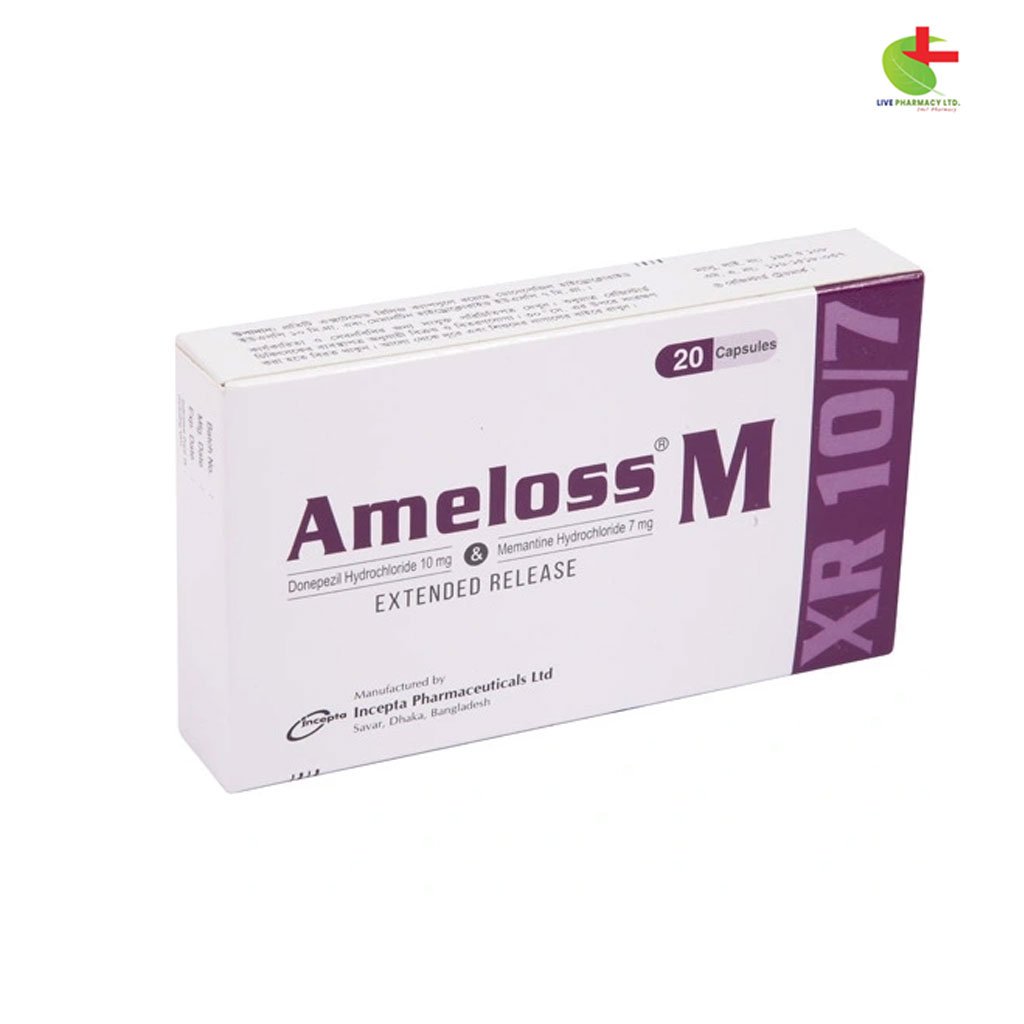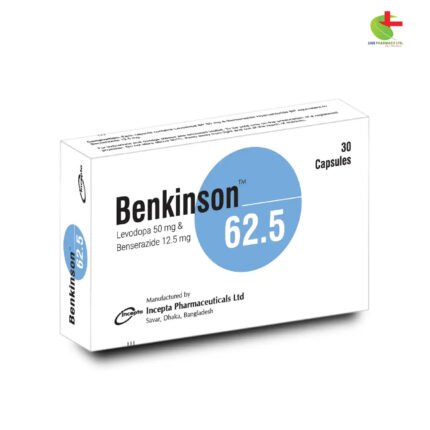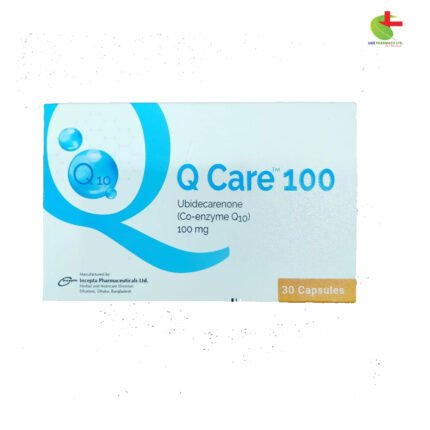Ameloss M 7/10
200.00৳ Strip(10)
- Memantine and Donepezil Hydrochloride Extended-Release Capsules are a combination of memantine (NMDA receptor antagonist) and donepezil (acetylcholinesterase inhibitor).
- Indicated for the treatment of moderate to severe Alzheimer’s dementia in patients stabilized on 10 mg donepezil.
- Available in various dosages, these capsules are taken once daily and can be adjusted based on patient needs.
- They help manage symptoms by improving cognitive function, though they do not prevent neurodegeneration.
 Brand
Brand
|
Incepta Pharmaceuticals Ltd |
|---|---|
 Generics
Generics
|
Memantine + Donepezil |
 Type
Type
|
Capsule |
Indications
Memantine and Donepezil Hydrochloride Extended-Release Capsules combine memantine hydrochloride, an NMDA receptor antagonist, and donepezil hydrochloride, an acetylcholinesterase inhibitor. These capsules are prescribed for managing moderate to severe Alzheimer’s disease dementia in patients who have stabilized on 10 mg of donepezil hydrochloride taken once daily.
Always follow the advice of a registered healthcare professional before taking any medication.
Composition
- 7/10 mg Capsule: Contains 7 mg of Memantine Hydrochloride (as Extended Release Pellets) and 10 mg of Donepezil Hydrochloride (as Immediate Release Pellets).
- 14/10 mg Capsule: Contains 14 mg of Memantine Hydrochloride (as Extended Release Pellets) and 10 mg of Donepezil Hydrochloride (as Immediate Release Pellets).
- 21/10 mg Capsule: Contains 21 mg of Memantine Hydrochloride (as Extended Release Pellets) and 10 mg of Donepezil Hydrochloride (as Immediate Release Pellets).
- 28/10 mg Capsule: Contains 28 mg of Memantine Hydrochloride (as Extended Release Pellets) and 10 mg of Donepezil Hydrochloride (as Immediate Release Pellets).
Pharmacology
This extended-release formulation of Memantine and Donepezil combines two active ingredients, each acting through distinct mechanisms to address the pathophysiology of Alzheimer’s disease:
- Memantine: Memantine acts as a low to moderate affinity NMDA receptor antagonist, selectively binding to NMDA receptor-operated cation channels. This helps modulate glutamate activity, which is believed to contribute to Alzheimer’s disease symptoms. However, there is no evidence to suggest that memantine halts or reverses neurodegeneration in Alzheimer’s patients.
- Donepezil: Alzheimer’s cognitive symptoms are linked to a deficiency in cholinergic neurotransmission. Donepezil helps alleviate this by inhibiting acetylcholinesterase, increasing acetylcholine concentrations in the brain. However, it does not stop or slow neurodegenerative progression in Alzheimer’s disease.
Dosage & Administration
- For patients stabilized on 10 mg Donepezil, the initial dose of Memantine and Donepezil Extended-Release Capsules should be 7 mg/10 mg once daily in the evening. The dose may be increased weekly in 7 mg increments until the recommended maintenance dose of 28 mg/10 mg is reached.
- For patients currently on memantine (10 mg twice daily or 28 mg extended-release once daily) and donepezil 10 mg daily, switch to 28 mg/10 mg extended-release capsule once daily in the evening.
These capsules can be taken with or without food. The capsules should be swallowed whole or opened and sprinkled on applesauce but should not be divided, chewed, or crushed.
- For patients with severe renal impairment, the recommended dose is 14 mg/10 mg once daily.
Always follow the advice of a registered healthcare professional before taking any medication.
Interactions
- NMDA antagonists: Use with caution when combining with other NMDA receptor antagonists.
- Anticholinergic medications: Caution is advised, as donepezil may interfere with these drugs.
- Succinylcholine and similar neuromuscular blockers: Co-administration may cause synergistic effects with cholinergic agonists.
Contraindications
Memantine and Donepezil Extended-Release Capsules are contraindicated in patients who have a known hypersensitivity to memantine, donepezil, piperidine derivatives, or any components of the formulation.
Side Effects
Common adverse reactions (≥5% incidence) observed with Memantine include headache, dizziness, and diarrhea. With Donepezil, side effects may include diarrhea, anorexia, vomiting, nausea, and ecchymosis, occurring at twice or more the frequency of placebo.
Pregnancy & Lactation
There is insufficient data on the safety of Memantine and Donepezil in pregnant women or breastfeeding mothers. Its use should be considered only if clearly necessary, and any potential risks should be discussed with a healthcare provider.
Precautions & Warnings
- Anesthesia: Memantine and Donepezil may enhance the effects of succinylcholine-type muscle relaxants during anesthesia.
- Cardiovascular effects: Monitor for signs of bradycardia or heart block, as these medications can affect the heart’s electrical conduction.
- Gastrointestinal concerns: Be alert for symptoms of gastrointestinal bleeding, especially in patients at high risk for ulcers.
- Bladder issues: May cause bladder outflow obstructions.
- Urinary pH: Conditions that raise urine pH may reduce the elimination of memantine, leading to elevated plasma levels.
Use in Special Populations
- Pediatric Use: Safety and efficacy in children have not been established.
- Renal Impairment: No dosage adjustment is required for mild to moderate renal impairment.
- Hepatic Impairment: No dosage adjustment is needed for mild to moderate liver impairment. This drug has not been studied in patients with severe hepatic impairment.
Therapeutic Class
Anti-Alzheimer Drugs
Storage Conditions
Store below 30°C, away from light and moisture. Keep out of reach of children.













Reviews
There are no reviews yet.